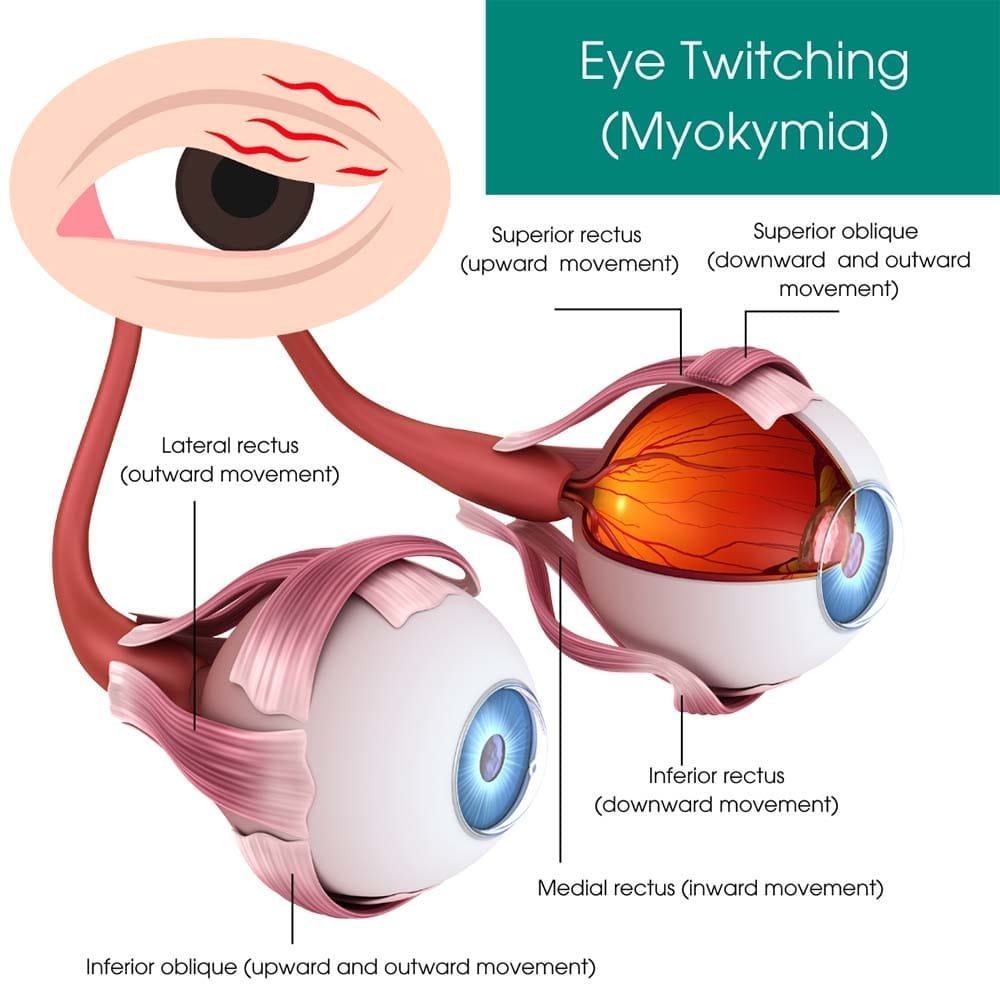Myokymia is the technical term for eye twitching that refers to a movement or spasm of the eye muscles or eyelid that can’t be controlled. It’s characterized by tiny contractions in the muscles of the eyelid. It most commonly affects the lower lid but can also affect the upper eyelid. Without eye twitching treatment, myokymia can be annoying, but it isn’t usually cause for serious concern.
If you’re looking for an optometrist that knows how to treat eye twitching in the Manhattan area, look no further than Eye Physicians. They provide expert treatment for eye twitching as well as comprehensive eye care including routine eye exams and emergency eye care for you and your children.

Stress affects the body in many different ways and is a leading cause of eye twitching. Other causes of myokymia include:
Certain medications, such as medicine used to treat Parkinson’s disease, may cause eye twitching, but this is a rare cause of the condition. Even more rarely, persistent eye twitching may be a sign of an underlying neurological condition such as:
The main symptom of myokymia is an eyelid that twitches uncontrollably. Other symptoms you may experience include:
To determine if you have myokymia, your NYC eye doctor does a full examination and takes your medical history. If you have symptoms of myokymia that have been ongoing for several months, your ophthalmologist may order imaging tests such as an MRI or CT scan. This type of testing can help your doctor pinpoint the cause of your eye twitching and the best form of treatment for myokymia and treatment for the underlying condition that led to the eyelid twitching.
Muscle twitching can affect any area of the body. Generalized myokymia can cause persistent contractions, stiffness and weakness of muscles all over the body. Other types of myokymia that specifically affect the eyes include:
Facial myokymia is a type of myokymia that specifically affects the facial muscles. It may affect one side of the face or both. Hemifacial spasm is a similar condition that affects only one side of the face and can occur when the facial nerve is compressed.
Eye twitch treatment isn’t always necessary, since the symptoms frequently go away on their own within a few minutes, hours or days. If symptoms persist, however, your NYC eye doctor may recommend myokymia treatment options that you can try at home, which may include:
If your lifestyle is sedentary, work at becoming more active. Walking at least 30 minutes a day improves your overall health and your ability to cope with stress, which helps relieve eye twitching. If home remedies fail to provide you with sufficient treatment for eye twitching, your doctor may suggest more aggressive eye twitch treatment such as:
Some people get relief from acupuncture. And in rare cases, surgery may be considered. Your Manhattan eye doctor isn’t likely to recommend surgery unless your symptoms are severe and haven’t been reduced using other approaches to treatment.
Eye twitching affects most people at some point and is usually only a minor annoyance. Some things you can do to help your eyes stay healthy that may reduce the risk of developing eye twitching include:
Your eye health is affected by your overall health. It’s important to make healthy lifestyle choices such as including regular exercise in your daily routine and eating nutritious foods. Having regular eye exams by reputable and experienced eye care professionals is the best way to protect your eye health and your vision and ensure that any eye disorders are caught early.
Your eyes deserve top notch care, and that’s exactly what you’ll find at Eye Physicians. Contact the experts today if you have eye twitching, blurry vision and headaches or any type of eye pain or discomfort. They strive to get you in and out of the office in under an hour with a definitive diagnosis and effective steps for how to treat eye twitching that’s affecting your life.
Eye Physicians
110 Lafayette St, Suite 503
New York, NY 10013
(212) 292-4814
Entrust the care of your precious eyesight to highly skilled and experienced eye care professionals. For top-notch ophthalmologists and optometrists in Downtown Manhattan, choose Eye Physicians. Eye Physicians ensures prompt care, precise diagnosis, and personalized treatment plans.
Schedule an Appointment